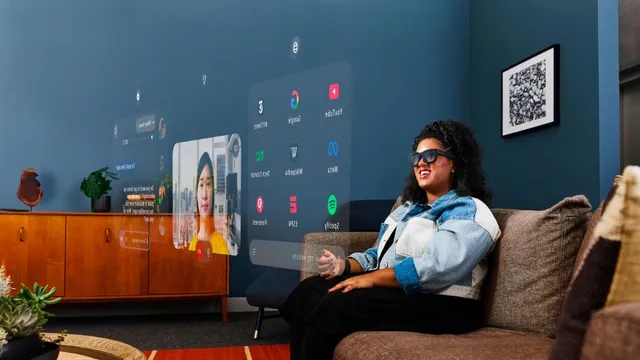- By Ashish Singh
- Thu, 26 Sep 2024 11:19 AM (IST)
- Source:Reuters
Meta Platforms, Facebook's parent business, announced the first functional prototype of its Orion augmented reality glasses at its annual Connect conference on Wednesday. The California-based company also revealed its plans for future goods that combine the virtual and physical worlds.
CEO Mark Zuckerberg declared, "This is the physical world with holograms overlaid on it," as he dramatically removed the bulky black glasses from a metal case that had been handed to him on stage.
"For now, I think the right way to look at Orion is as a time machine," he stated. "These glasses exist, they are awesome and they are a glimpse of a future that I think is going to be pretty exciting."
Meta also unveiled a new Quest mixed-reality headset and additional AI chatbot features for its services. On Wednesday, Meta shares closed at a record high, up 0.9% at $568.31.
The Orion glasses are driven by specially tailored silicon created by Meta and are composed of magnesium alloy. The glasses will allow users to engage via speech, wrist-based neural interface, and hand tracking. Before distributing it to customers later on, Zuckerberg stated that Meta intends to work on making it more affordable, sleeker, and smaller.
For years, Big Tech has been creating augmented reality devices, but the most well-known ones—like Google's Glass glasses—have been flops.
When Zuckerberg first turned the largest social media platform in the world towards creating immersive "metaverse" systems in 2021, he positioned augmented reality technology as a kind of magnum work.
On the other hand, hefty development costs and technological barriers have made product delivery difficult. Analyst Paolo Pescatore of PP Foresight stated that Meta's goal is to make virtual and augmented reality goods as accessible and inexpensive as possible. However, he continued, saying that consumers needed some persuasion because they were "still wary of AI".
According to a source who spoke before the event, Meta plans to provide its first pair of AR glasses to consumers in 2027, at which point technological advancements should lower the cost of manufacture.
Instead of giving a direct demonstration of Orion's capabilities during his announcement, Zuckerberg played a video that showed how users responded to the device. A few glances of text messages and visuals seen through the glasses were shown in the video, and Jensen Huang, the CEO of Nvidia, was visible among the testers.
READ: Meta Introduces Celebrity Voices For AI Chatbot, Including John Cena And Judi Dench
The Ray-Ban Meta smart glasses, which at first sparked little interest but gained traction last year after Meta included an AI assistant, are currently the closest thing to the prototype. This year, Meta revealed AI upgrades for those glasses, enabling users to do things like read QR codes and stream music from Spotify when spoken to.
The business intends to add the capacity to create videos later this year, along with real-time language translation between English and French, Italian, or Spanish.
In order to demonstrate the language tool, Zuckerberg had a live discussion with Brandon Moreno, a mixed martial arts fighter from Mexico. During the conversation, the glasses spoke translations from English to Spanish and vice versa.

